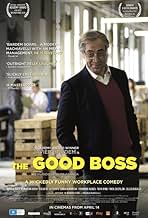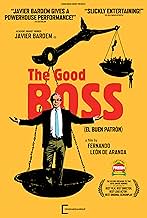IMDb-BEWERTUNG
7,1/10
15.804
IHRE BEWERTUNG
In Erwartung des Besuchs einer Kommission, die seinem Unternehmen eine Auszeichnung verleihen könnte, versucht der Inhaber eines Unternehmens, die Probleme seiner Mitarbeiter rechtzeitig zu ... Alles lesenIn Erwartung des Besuchs einer Kommission, die seinem Unternehmen eine Auszeichnung verleihen könnte, versucht der Inhaber eines Unternehmens, die Probleme seiner Mitarbeiter rechtzeitig zu lösen.In Erwartung des Besuchs einer Kommission, die seinem Unternehmen eine Auszeichnung verleihen könnte, versucht der Inhaber eines Unternehmens, die Probleme seiner Mitarbeiter rechtzeitig zu lösen.
- Regie
- Drehbuch
- Hauptbesetzung
- Auszeichnungen
- 34 Gewinne & 48 Nominierungen insgesamt
Yaël Belicha
- Inés
- (as Yael Belicha)
Nicolas Ruiz
- Hijo de Jose
- (as Nicolás Ruiz)
Empfohlene Bewertungen
What makes for a Good Boss? Successful in business. Dedicated to the company. Loyal to his workers. At first glance Blanco (Javier Bardem) seems to check all the boxes and more. Blanco runs a respected corporation building weight scales. He's charming, handsome and loves to get up close and personal in all his affairs.
Writer-Director Fernando Leon de Aranoa sets in motion a fairly simple plotline. Blanco's company is up for a prestigious industry award. Within a few days, an official committee will be touring his factory and offices to see if they are worthy. As expected, over those days little fires start popping up: A disgruntled worker (Oscar de la Fuente) is laid off, a pretty new intern (Almudena Amor) catches Blanco's eye, his trusted Production chief (Manolo Solo) is letting his home issues affect his work etc. Etc..
At first, these seem like petty issues which Blanco can put out without much muss amounting to small nuisances on the way to the next prized plaque in his trophy case. De Aranoa's script and direction are sharp. Little details are cleverly dropped in at precisely the right moment. As they accumulate, the story becomes a sly, dark satire. Bardem's breezy charisma is clear and ever-present, but, the actor subtly reveals a more steely side. The supporting cast is strong with Zeltia Montes' score boosting them along for the ride.
In the end the cynical capitalist message is that to be a truly 'Good Boss' one only has to think about what benefits only a single person no matter how large the corporation: YOU.
THE GOOD BOSS was last year's official Best International Film Oscar submission by Spain somewhat controversially edging out Almodovar's excellent PARALLEL MOTHERS. Both are really fine movies that are certainly worth seeing.
Writer-Director Fernando Leon de Aranoa sets in motion a fairly simple plotline. Blanco's company is up for a prestigious industry award. Within a few days, an official committee will be touring his factory and offices to see if they are worthy. As expected, over those days little fires start popping up: A disgruntled worker (Oscar de la Fuente) is laid off, a pretty new intern (Almudena Amor) catches Blanco's eye, his trusted Production chief (Manolo Solo) is letting his home issues affect his work etc. Etc..
At first, these seem like petty issues which Blanco can put out without much muss amounting to small nuisances on the way to the next prized plaque in his trophy case. De Aranoa's script and direction are sharp. Little details are cleverly dropped in at precisely the right moment. As they accumulate, the story becomes a sly, dark satire. Bardem's breezy charisma is clear and ever-present, but, the actor subtly reveals a more steely side. The supporting cast is strong with Zeltia Montes' score boosting them along for the ride.
In the end the cynical capitalist message is that to be a truly 'Good Boss' one only has to think about what benefits only a single person no matter how large the corporation: YOU.
THE GOOD BOSS was last year's official Best International Film Oscar submission by Spain somewhat controversially edging out Almodovar's excellent PARALLEL MOTHERS. Both are really fine movies that are certainly worth seeing.
The writing of the dialogue is terrific. Every carefully-scripted word and situation is loaded with bad blood, mercilessly shelling out the miseries of labor relations in Spain. Bardem's performance as a paternalistic and cronyistic businessman is superlative. A necessary condition to fully enjoy the film, since everything revolves around him. A tad slow development of the story notwithstanding (stylistically justified around a metaphor of balancing the scales?), we are in for a ride.
Javier Bardem performs the character of a seemingly likeable fatherly figure boss that is extremely twisted, rule-bending and immoral underneath, perfectly. Even though at times the script is incredibly cringe and hyperbolic, this satire successfully delivers the message of the limits that corruption and corporate world can make people reach. It is a comedy that you leave feeling more disturbed than a drama or a thriller.
By Maryam Tavatav (Critic)
Directed by Fernando Leon de Aranoa, "The Good Boss", as the representative of Spanish cinema at the 2021 Academy Awards, explores societies based on political-economic and capitalist systems and narrates becoming the number one in the workplace at any cost.
Blanco is the owner of a factory of industrial scales. This mere choice of scales connoting justice begins the chain of symbolism in this film. Throughout his speeches and interaction with others, Blanco manifests himself at the beginning of the story, as a compassionate, sympathetic boss who is willing to do anything for his factory workers. He keeps retelling this key phrase: "Every employee's problem is mine" and this is a fallacious statement that has been repeated over and over again throughout the organization's history causing all workers to believe in its legitimacy. However, another truth emerges as the film proceeds.
The film's main plot is based on this question: beyond this technicolor of slogans the capitalists chant in support of the workers, is their true face as sympathetic and benevolent as they look before the public and media? It remains to be seen to what extent these pretender capitalists adhere to moral statements when a tiny margin of their capital is jeopardized. This view does not contradict the concept of capital since the circulation of capital in society will certainly bring about economic prosperity that might be beneficial to the people. Meanwhile, the main point is how this benefit is to be distributed. Do people share in the benefits as much as they have contributed to the generation of wealth?
What elements must be in place in this cycle to achieve a higher level of assets? At this point, the main conflict is created; where various economic and political schools have made an attempt to come up with an answer. The script of a good boss also brings to light the extent of adherence to principles that are challenged in the face of a financial crisis and where the interest of employees comes into play. Simply put, when a problem occurs at the heart of the factory, despite Blanco's pretentious conduct favoring the workers, the manpower becomes the means to add just one more award to the wall of the owner's house at any cost. This comedic nature of the film, in a dark setting, mocks Blanco's superficial view of the fate of his workers. The film's final scene illustrates framed awards, with writings such as "Justice", here and there on the factory's walls, while its atmosphere is still filled with corruption and inequality.
The Good Boss can be introduced as the most allegoric and figurative film of the year considering its abundant use of meaningful symbols. The irony depicted in the film regarding the sense of justice and benevolence demonstrates that the director's preoccupation is way beyond a mere worker-employer incompatibility in the workplace. Behind Blanco's apparent good-naturedness in the guise of a spiritual father lives another human being: a man enjoying inheritance who is willing to do anything to preserve his capital so that he can add a framed award to those of others on the walls of his factory, lest a single penny be deducted from its capital; He somewhat represents a capitalist society that is willing to crush everything under the boots of power for the sake of achieving its material goals. Herein, the power relations are predefined and the authority is exclusively in the hands of a few and the others may enjoy a marginal benefit out of their vast fortune through deceitfulness. In fact, the concept of meritocracy and effort is the overlooked component of such thinking.
The element of surprise, which seems to be missing in almost all films these days, is well implemented in this film. The first impression that Blanco leaves on the audience is one sympathetic boss who follows the recent concepts in management science and perceives his workforce as the capital of his factory, while in the second half of the film, his true character is revealed once Blanco is put in a situation that his interests are at stake.
The brilliant performance of "Javier Bardem" in the leading role of this film must not be neglected. He shows such a dramatic personality change in his role that the viewer fully understands the nuances of his characteristics; his acting thoroughly serves the film's purposes and helps advance the narrative. The presence of influential supporting roles and sub-characters has also contributed to the completion of this puzzle and created an effective flow of transformation. The Good Boss possesses a professional cast of actors who have done well in their roles. The use of symbols and attention to detail have played a major role in expressing the main concept and theme of the film, especially when the seeds planted earlier are harvested and these symbols are used in the ending.
This film is a fine example of how deep political-economic concepts, whose presence is a grave concern in human life, can be sharply criticized with the correct and principled use of humor and comedy. Fierce criticism of political and economic structures does not necessarily require the production of serious films; rather one can voice the most serious criticisms by making a comedy film and force the viewer to contemplate.
Directed by Fernando Leon de Aranoa, "The Good Boss", as the representative of Spanish cinema at the 2021 Academy Awards, explores societies based on political-economic and capitalist systems and narrates becoming the number one in the workplace at any cost.
Blanco is the owner of a factory of industrial scales. This mere choice of scales connoting justice begins the chain of symbolism in this film. Throughout his speeches and interaction with others, Blanco manifests himself at the beginning of the story, as a compassionate, sympathetic boss who is willing to do anything for his factory workers. He keeps retelling this key phrase: "Every employee's problem is mine" and this is a fallacious statement that has been repeated over and over again throughout the organization's history causing all workers to believe in its legitimacy. However, another truth emerges as the film proceeds.
The film's main plot is based on this question: beyond this technicolor of slogans the capitalists chant in support of the workers, is their true face as sympathetic and benevolent as they look before the public and media? It remains to be seen to what extent these pretender capitalists adhere to moral statements when a tiny margin of their capital is jeopardized. This view does not contradict the concept of capital since the circulation of capital in society will certainly bring about economic prosperity that might be beneficial to the people. Meanwhile, the main point is how this benefit is to be distributed. Do people share in the benefits as much as they have contributed to the generation of wealth?
What elements must be in place in this cycle to achieve a higher level of assets? At this point, the main conflict is created; where various economic and political schools have made an attempt to come up with an answer. The script of a good boss also brings to light the extent of adherence to principles that are challenged in the face of a financial crisis and where the interest of employees comes into play. Simply put, when a problem occurs at the heart of the factory, despite Blanco's pretentious conduct favoring the workers, the manpower becomes the means to add just one more award to the wall of the owner's house at any cost. This comedic nature of the film, in a dark setting, mocks Blanco's superficial view of the fate of his workers. The film's final scene illustrates framed awards, with writings such as "Justice", here and there on the factory's walls, while its atmosphere is still filled with corruption and inequality.
The Good Boss can be introduced as the most allegoric and figurative film of the year considering its abundant use of meaningful symbols. The irony depicted in the film regarding the sense of justice and benevolence demonstrates that the director's preoccupation is way beyond a mere worker-employer incompatibility in the workplace. Behind Blanco's apparent good-naturedness in the guise of a spiritual father lives another human being: a man enjoying inheritance who is willing to do anything to preserve his capital so that he can add a framed award to those of others on the walls of his factory, lest a single penny be deducted from its capital; He somewhat represents a capitalist society that is willing to crush everything under the boots of power for the sake of achieving its material goals. Herein, the power relations are predefined and the authority is exclusively in the hands of a few and the others may enjoy a marginal benefit out of their vast fortune through deceitfulness. In fact, the concept of meritocracy and effort is the overlooked component of such thinking.
The element of surprise, which seems to be missing in almost all films these days, is well implemented in this film. The first impression that Blanco leaves on the audience is one sympathetic boss who follows the recent concepts in management science and perceives his workforce as the capital of his factory, while in the second half of the film, his true character is revealed once Blanco is put in a situation that his interests are at stake.
The brilliant performance of "Javier Bardem" in the leading role of this film must not be neglected. He shows such a dramatic personality change in his role that the viewer fully understands the nuances of his characteristics; his acting thoroughly serves the film's purposes and helps advance the narrative. The presence of influential supporting roles and sub-characters has also contributed to the completion of this puzzle and created an effective flow of transformation. The Good Boss possesses a professional cast of actors who have done well in their roles. The use of symbols and attention to detail have played a major role in expressing the main concept and theme of the film, especially when the seeds planted earlier are harvested and these symbols are used in the ending.
This film is a fine example of how deep political-economic concepts, whose presence is a grave concern in human life, can be sharply criticized with the correct and principled use of humor and comedy. Fierce criticism of political and economic structures does not necessarily require the production of serious films; rather one can voice the most serious criticisms by making a comedy film and force the viewer to contemplate.
Fame and reputation is the priority of the boss with repeated spotlight shown on the wall of company awards. He takes huge pride and greatness of his achievements by indulging in all the fake commitments to his employees. They are not family, just resources to get things done. Last survey scene is so sarcastic with feminism, diversity and caring for elders in the company. All about balance. If not balanced, make it balanced. Like a bullet.
Wusstest du schon
- WissenswertesIt is the most nominated film in the history of the Goya Awards (Spanish Oscar) with 20 nominations.
- PatzerAlle Einträge enthalten Spoiler
- VerbindungenReferences Der Pate (1972)
- SoundtracksYala Bina
Written by Elham Al Wareeth, Mahmoud Ahmed, Marc Ferrari, & Matt Hirt
© By First Digital Music, 2FC Music & Universal Music Publishing S.I.U.
Top-Auswahl
Melde dich zum Bewerten an und greife auf die Watchlist für personalisierte Empfehlungen zu.
- How long is The Good Boss?Powered by Alexa
Details
- Erscheinungsdatum
- Herkunftsland
- Offizielle Standorte
- Sprachen
- Auch bekannt als
- The Good Boss
- Drehorte
- Jose del Hierro, Madrid, Spanien(Clothing Shop)
- Produktionsfirmen
- Weitere beteiligte Unternehmen bei IMDbPro anzeigen
Box Office
- Bruttoertrag in den USA und Kanada
- 363.130 $
- Eröffnungswochenende in den USA und in Kanada
- 22.363 $
- 28. Aug. 2022
- Weltweiter Bruttoertrag
- 7.334.753 $
- Laufzeit1 Stunde 56 Minuten
- Farbe
- Seitenverhältnis
- 2.39 : 1
Zu dieser Seite beitragen
Bearbeitung vorschlagen oder fehlenden Inhalt hinzufügen

Oberste Lücke
What is the Canadian French language plot outline for Der perfekte Chef - Willkommen in der Familie (2021)?
Antwort

![Tráiler [OV]](https://m.media-amazon.com/images/M/MV5BNTc1Y2M0MGItNjc4Yi00NmZmLTg2ZDItNWI4YmUxZjE1NDhjXkEyXkFqcGdeQXRyYW5zY29kZS13b3JrZmxvdw@@._V1_QL75_UX500_CR0)
































